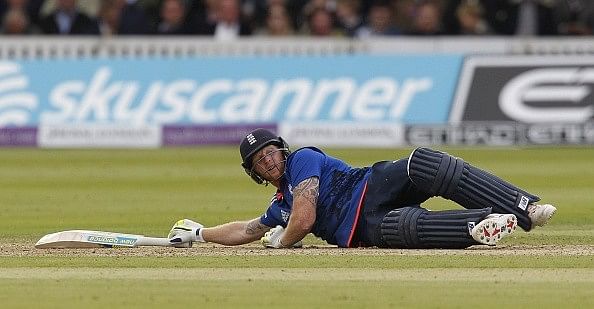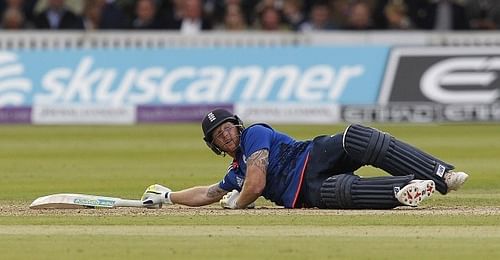
Dissecting the Ben Stokes dismissal and the 'Obstructing the field rule'

Riding on the back of half-centuries from skipper Steve Smith, George Bailey, and Mitchell Marsh, the Australians won the second ODI on the trot to make it 2-0 in the series away from home in England.
The match, however, will be etched in the memories of millions of fans around the globe, more so nearer to the British capital for reasons other than the clockwork performance of the boys down under.
In a rare occurrence, Ben Stokes became only the 6th batsman in International cricket to be adjudged out ‘Obstructing the field’. In case you missed the action, you could watch it here:
THE EVENT
With England placed at 141-3 in the 26th over, the match seemed to be headed for a picture finish when Stokes hit one straight back to Mitchell Starc. Starc flung the ball back to the stumps at the batting end where Stokes stopped the ball from hitting the stump with his hand far away from the body.
The Australians appealed for ‘Obstructing the field’ and the matter was referred to the third umpire who decided to go in favor of the Australians. Smith, who had the opportunity of calling the batsman back, refused to do so and that ended Stokes’ stay at the crease.
THE LAW:
Law 37 (Obstructing the field) states that “ Either batsman is out Obstructing the field if he wilfully attempts to obstruct or distract the fielding side by word or action. In particular, but not solely, it shall be regarded as obstruction and either batsman will be out Obstructing the field if while the ball is in play and after the striker has completed the act of playing the ball, as defined in Law 33.1, he wilfully strikes the ball with
(i) a hand not holding the bat, unless this is in order to avoid injury. See also Law 33.2 (Not out Handled the ball).
(ii) any other part of his person or with his bat. See also Law 34 (Hit the ball twice).”
INTERPRETING THE LAW:
In simple words, the law states that if a batsman intentionally attempts to distract the fielding side in any manner, he will be out obstructing the field.
The following act(s) are regarded as obstructing the field. It is important to note that this is not an exhaustive list. i.e., there can be other reasons not mentioned below:
a) If the ball is still in play and the batsman has played (or left) the ball bowled to him and following this set of action, if he intentionally hits the ball again with his ‘hand not holding the bat’ (to be read as a phrase) unless he is doing so in saving himself from injury (the ball is directed at his body).
b) If the ball is still in play and the batsman has played (or left) the ball bowled to him and following this set of action, if he intentionally hits or touches the ball with the bat or part of his body.
ROLE OF THE UMPIRE:
The umpire is similar to the judge of a civil or criminal court. He simply has the power to interpret the law and roll out decisions based upon the factors clearly mentioned down in the law (the rules in case of the umpire).
Clearly, Stokes’ hand was far away from his body when he stopped the ball thrown at him with the same hand. Section 37(1)(i) specifically states that such an act performed by the batsman is out regardless of any other fact or following event.
Hence, the umpire was well within his rights and was absolutely correct to adjudge the batsman “OUT” in the present scenario.
The Umpire is bound by the laws within which he is empowered to act. Anything he does out of the act will be ultra vires and an absolute mockery of the system laid down by the MCC.
POWERS VESTED IN THE OPPOSITION CAPTAIN:
There are two ways the law is formulated:
1. It is a written code of conduct
2. It is an act committed in common parlance.
Believe it or not, the first ever recorded instance of calling a batsman back after he was adjudged out took place over 80 years ago in 1934! Yes, that is true, in a Shield Game in Australia, Bill Woodfull recalled Jack Fingleton after he was given out by the on-field umpire.
A further probe into the matter revealed that the laws do not specifically allow for a batsman to be recalled after being given out. However, the same was eventually incorporated in the game, though I am not quite sure whether it is as a written rule or as common parlance.
However, that the batsman can be recalled after he is given out is not a matter of debate - it is a practice followed widely in world cricket today, a more recent example is Indian captain MS Dhoni recalling Ian Bell after he was dismissed in a weird fashion at the stroke of tea.
Hence, it is amply clear that Steve Smith had every right to call back Ben Stokes after he was adjudged out - alright he decided not to exercise in the present case.
CONCLUSION:
Though the Laws are clearly defined, there is no ethical code of conduct in World Cricket today. Everyone, the umpire, as well as the opposition captain, were well within their rights to do what they did?
But was it ethical to appeal for such a dismissal? Should Smith have called back Stokes? Should the game be played as fair as possible or the hunger to win overrides the desire of fairness?
There is no single answer to these questions. Simply a matter of interpretation.
What’s yours? Please leave the same in the comment section below.
Was it the right decision to give Ben Stokes out for obstructing the field?
Posted by Sportskeeda on Saturday, September 5, 2015